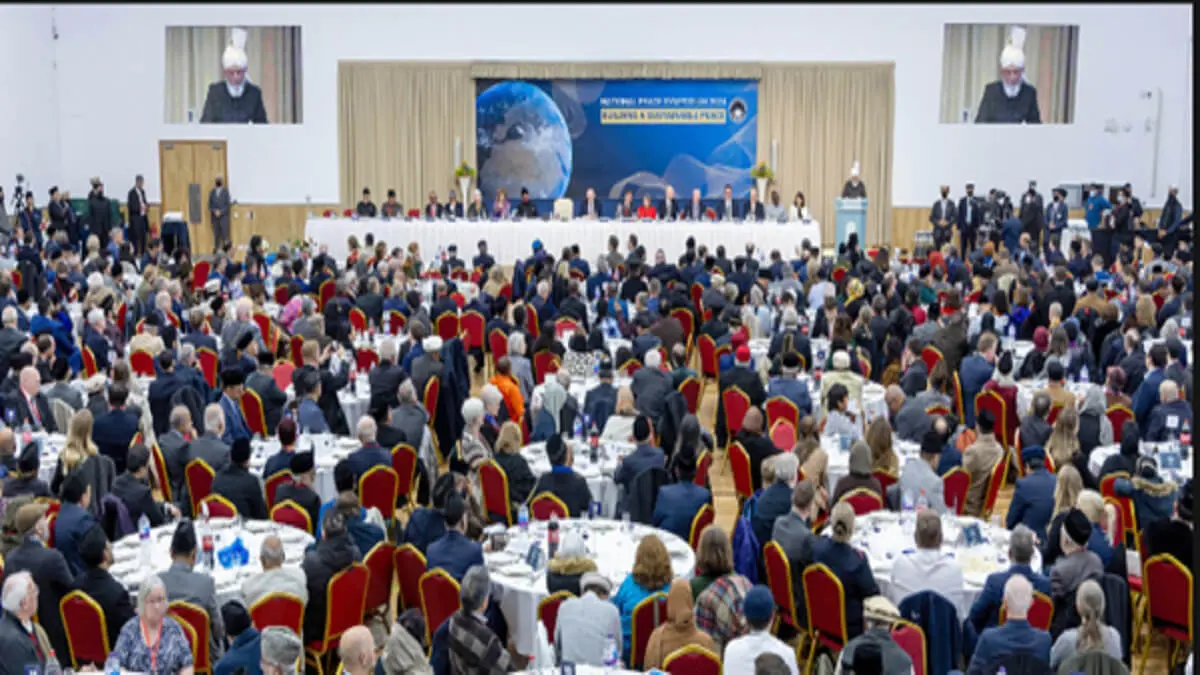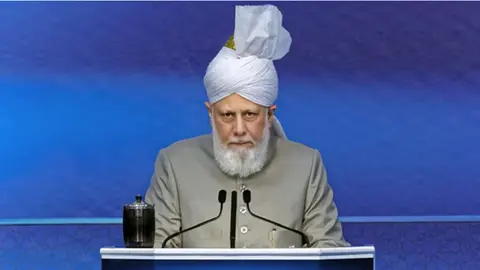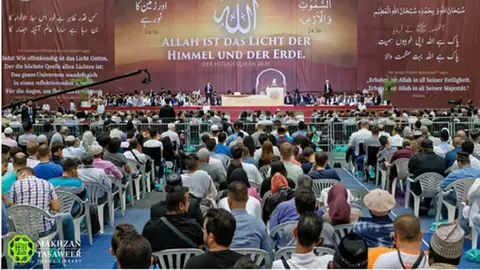The critical state of the world: how to achieve peace (I)

(Keynote address by Hazrat Mirza Masroor Ahmad, World Leader of the Ahmadiyya Muslim Community, National Peace Symposium, UK 2024.
His Holiness Hazrat Mirza Masroor Ahmad, World Leader of the Ahmadiyya Muslim Community, said:
'Bismillahir Rahmanir Rahim (In the name of God, the Gracious, the Merciful).
Distinguished guests, Assalamu Aleikum Wa Rahmatul'lahi wa Barakatuhu (peace and blessings of God be upon you).
Today, once again, we have gathered at this event organised by the Ahmadiyya Muslim Community to discuss and reflect on how we can overcome division in society and establish genuine peace in the world.
For more than two decades, I have urged governments, politicians and all people to play their part in ensuring social cohesion in our individual societies and wider peace and harmony in the world. I have expressed my views on how we can end all forms of war, whether conflicts waged falsely in the name of religion or those that are overtly geopolitical. I have spoken not only of the pressing need to end wars between nations, but also to address the frustrations that exist locally within communities and to strive for peace in those nations where civil wars or internal disputes arise.
Indeed, history teaches us that internal conflicts can spill over into regional wars, often fuelled by the interference and influence of external powers and foster instability and division in other countries to serve their interests.
In recent decades, we have witnessed the devastating consequences of such interference in countries such as Kuwait, Iraq, Syria and Sudan. Above all, I have repeatedly warned that the unjust policies of major powers and the unjust political, legal and economic systems that have prevailed in much of the world are unleashing a rising tide of inequality, which in turn is fuelling global instability and insecurity.
Over the years, politicians, intellectuals or members of the public have always agreed with my assertion that we must strive for peace. However, many of them also expressed the view, either directly or indirectly, that I was wrong to believe that existing conflicts could possibly escalate into global war and even trigger the use of nuclear weapons. Many considered this unnecessarily pessimistic. For a long time, even those intimately involved in world affairs, such as politicians, foreign policy journalists or analysts, disagreed with me, either because of their idealism and their desire to look at the world through rose-coloured glasses or perhaps because of an inability to learn lessons from history. They apparently ignored the widening cracks that have opened up in international relations in recent decades. Perhaps they simply did not want to accept the reality of what was before their eyes. As they say, ignorance is bliss.
Yet today, as wars rage here in Europe, the Middle East and elsewhere, many of the same people are sounding the alarm about the threat of a global war in which nuclear weapons could be used to wreak unimaginable devastation on the world. Despite understanding this, many still seem unwilling to consider what needs to be done to end these conflicts and remain reluctant to listen to the genuine voices for peace that exist in the world.
With this in mind, as I thought about today's event, I wondered if there was any point in us meeting here again. What good would it do us to talk about peace and justice if those with the power and ability to affect change were not willing to listen to us? The stark reality is that even those institutions founded for the primary purpose of maintaining peace and security in the world are becoming increasingly irrelevant.
For example, the United Nations has become a weak and almost impotent body where a few dominant nations wield all the power and easily override the views of the majority. Instead of deciding every issue on the facts and merits, nations have formed alliances and vote according to their own interests. Ultimately, critical decisions are made by a few privileged nations in whose hands is the power of veto. Instead of faithfully serving the cause of peace and justice, they wield their veto as a trump card wherever narrow interests are threatened, regardless of whether their decision destroys the peace and prosperity of other nations and leads to the death and destruction of scores of innocent people. Therefore, let it be clear that where there is a veto power, the scales of justice can never be balanced.
Sin embargo, a pesar de estas reservas, me di cuenta de que debía aprovechar esta oportunidad para hablar, porque el Islam enseña a los musulmanes a no vacilar nunca en la búsqueda de la paz. Nos enseña a decir la verdad para que, al rendir cuentas ante Dios Altísimo, un creyente pueda afirmar sinceramente que hizo todo lo posible para salvar a Su creación de la destrucción.
Además, el Santo Profeta del Islam (sa) ha declarado que la principal forma de “yihad” (un término que constantemente se malinterpreta y se tergiversa) es hablar con sinceridad y valentía ante los propios líderes, especialmente aquellos que son duros de corazón, injustos y crueles. Ciertamente, si naciones más débiles o individuos, como yo, que no tienen afiliación política intentan hablar, rara vez lo agradecen, y quienes lo hacen pueden afrontar dificultades o arriesgarse a sanciones.
A pesar de esto, la Comunidad Musulmana Ahmadía, basándose en las enseñanzas del Islam, continúa, y siempre continuará, esforzándose seriamente por la causa de la paz y defendiendo los derechos de aquellos que son impotentes y víctimas de la injusticia. Si Dios quiere, nos esforzaremos constantemente por utilizar todos los medios que tengamos para influir en aquellos que estén a nuestro alcance, ya sean políticos, formuladores de políticas, intelectuales y otros, para establecer la paz en el mundo. De hecho, es posible que algunos de ustedes sean conscientes de los constantes esfuerzos que nuestra Comunidad está haciendo para fomentar la paz y aliviar el sufrimiento de quienes se encuentran en graves dificultades físicas o emocionales.
Por eso, después de estas palabras introductorias, deseo ahora expresar mi opinión sobre cómo establecer la paz en el mundo.
However, despite these reservations, I realised that I had to take this opportunity to speak out, because Islam teaches Muslims never to waver in the pursuit of peace. It teaches us to speak the truth so that, when accountable to God Most High, a believer can sincerely affirm that he or she did everything possible to save His creation from destruction.
Moreover, the Holy Prophet of Islam (sa) has stated that the main form of "jihad" (a term that is constantly misunderstood and misrepresented) is to speak truthfully and bravely before one's leaders, especially those who are hard-hearted, unjust and cruel. Certainly, if weaker nations or individuals, such as myself, who have no political affiliation attempt to speak out, they rarely appreciate it, and those who do may face hardship or risk sanctions.
Despite this, the Ahmadiyya Muslim Community, based on the teachings of Islam, continues, and will always continue, to strive earnestly for the cause of peace and to defend the rights of those who are powerless and victims of injustice. God willing, we will constantly strive to use whatever means we have to influence those within our reach, be they politicians, policy makers, intellectuals and others, to establish peace in the world. Indeed, some of you may be aware of the constant efforts our Community is making to promote peace and to alleviate the suffering of those who are in serious physical or emotional distress.
So, after these introductory words, I now wish to express my views on how to establish peace in the world.
As far as religion is concerned, none of the Founders of the major religions, whether Prophet Jesus (lpD), Prophet Moses (lpD) or any other prophet of God, nor the Founder of Islam, Holy Prophet Muhammad (lpbD) ever taught their followers to ignore the peace of society and resort to injustice or aggression. While it is true that in certain extreme circumstances they permitted the use of limited force, it was done solely with the intention of ending war and oppression.
As for Islam, it literally means peace, and every aspect of its teachings reflects this name. For example, in chapter 42, verse 41 of the Holy Quran, God Most High commands that when a person or nation has been wronged, one should never respond in a disproportionate manner or do so for the purpose of seeking revenge. Moreover, Al'lah says that it is better to forgive if it can lead to reform. Chapter 49, verse 10 of the Holy Quran says that if two nations are at war, the neutral parties should mediate between them and strive to establish peace based on the principles of justice and equity. If after having reconciled, one of the parties violates the terms of the agreement and wages war again, other nations should unite vigorously against the aggressor until he desists from his aggressive behaviour. Once it has ceased, the other nations must also cease using force.
The goal must always be to build a sustainable peace based on justice. It must not be the case that a third party takes advantage of the vulnerability of the parties to the conflict by usurping their rights for its own benefit. If this principle were observed in the UN and other relevant bodies, conflicts would be resolved much more amicably and quickly. However, it will be impossible for true peace to emerge as long as nations, either directly or through their powerful allies, can use the power of the veto. Unfortunately, because of its inherent lack of justice, the fate of the United Nations seems to mirror that of its failed predecessor, the League of Nations. And if the system of international law, weak as it is, were to collapse completely, the resulting anarchy and destruction would be far greater than we can imagine.
While there are countless conflicts in the world, the most pressing and dangerous are those between Israel and Hamas and the ongoing war between Russia and Ukraine. Some people may believe, or have been conditioned to think, that the Israeli-Palestinian conflict is a religious war. However, in reality it is a geopolitical and territorial conflict. As for the war in Ukraine, it is clear that it is a geopolitical war fought for territorial reasons. I firmly believe that there is only one way to put an end to these wars: by ensuring that justice prevails and that any agreement reached is based on fairness and not on what best serves the interests of external powers. Otherwise, there will be no benefit to the United Nations or to international law, and the only rule that will apply will be the one that states that "might is right" i.e. 'might is right'.
As for the Ukraine war, Russia has veto power in the UN Security Council, while in fact Ukraine also has veto power by virtue of its alliance with those Western nations that are permanent members of the Security Council. How can an agreement be reached if both sides can effectively exercise a veto? Why would either side be motivated to give an inch if they know they can veto any agreement that is not entirely in their favour?
As for what is happening in Gaza, while both the Israelis and the Palestinians have their supporters, the veto power has only been used in Israel's favour since the current war broke out several months ago. For example, in February, 13 of the 15 members of the UN Security Council voted for an immediate ceasefire in Gaza, but the US used its veto power and the resolution was rejected. How can peace be established when the majority opinion is so easily dismissed? That is not justice, but a rejection of democracy and the principle of equality.
(lpbD) - peace and God's blessings be upon him.
(lpd) - peace be upon him.
(We will continue this discourse in the next installment: "THE CRITICAL STATE OF THE WORLD: HOW TO GET PEACE (II)".



